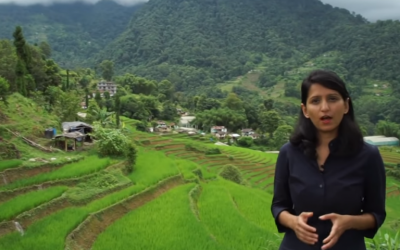India’s State of Sikkim Banishes All Pesticides and GMO, Watches Both Wildlife and Tourism Flourish

The organic movement has been seen as a fad and a trend by many, but others call it a necessity in a changing world where toxic chemicals are increasingly killing life from the bottom of the food chain up, including people as the story of terminally ill groundskeeper Dewayne Johnson demonstrated.
Organic agriculture is still a ways off from becoming truly mainstream in the United States, especially with companies like Bayer (now the owner of Monsanto) renewing their push for more pesticides and new technology-intensive methods of farming.
But even as the U.S. continues to approve new “longer-lasting” GMOs, harsh, toxic pesticides and other unnatural “innovations,” other parts of the world are anteing up on organic farming like never before.
While these changes have been far from simple, places like the Himalayan state of Sikkim in India are making immense progress, helping to support the health of pollinators, human beings, and the environment in the process.
Indian state first go 100% organic
In January 2016, the state of Sikkim, in the shadow of the world’s third-tallest peak Mt. Kanchenjunga, succeeded in becoming the first fully organic state in India, and probably the world. A few short years later, there are still plenty of kinks to be worked out, but the benefits are being seen first hand.
Bee populations are said to be rebounding, with plants dependent on bee pollination like cardamom providing much higher yields. Cardamom for example has risen by more than 30% since 2014, a report from The Washington Post said.
Tourism to the region has also increased nearly 70% since the state went organic according to the BBC (see video below), and soil health has rebounded tremendously, as is usually the case when organic methods are applied. Marketed as an eco-friendly dream destination, the region boasts 500 species of butterflies, 4,500 types of flowering plants, and rare wildlife like the red panda, Himalayan bear, snow leopards and yaks.
The state also received a Future Policy Award 2018 at a UN ceremony in Rome, beating out 51 other nominees from 25 countries worldwide for best promoting agro-ecology.
While many farmers have struggled in the years following Sikkim’s mandated switch to organic, they have also said that their crop yields have rebounded to what they were before the change. In response to the increasing signs of success, Indian Prime Minister Narenda Modi has recognized the state for its contributions and pledged further support for organic farmers throughout India.
Thus far, there have also been concerns about ineffectiveness of the bio-pesticides being used in place of synthetic ones, as well as rising prices and diseases affecting crops.
The state has also had to rely on conventional crops from West Bengal to help feed its population while farmers continue to learn how best to maximize yields with assistance from government programs.
But positive signs abound, as shown in the BBC report below.
The world’s biggest GMO docu-series is BACK and free to watch now through March 10, 21019! Click here to secure your spot and watch GMOs Revealed now, the future of our food system depends upon it! Here’s the link to watch one more time.
Yields up for all but one crop in India’s first organic state
While individual farmers have reported difficulties in multiple cases including much lower income in some places, as a whole things seemed to be looking up yield-wise as of April 2017, when it was reported that productivity per capita among four major crop types had risen.
The Sikkim mandarin orange, a local specialty crop, saw yields per capita drop 22% from 2010-2011 to 2015-2016.
But during that same time period, all other fruits rose by 5% on average, total spices including ginger and cash crop turmeric rose 2%, large cardamom rose .8%, and all roots & tubers including potatoes rose by .6%.
Officials say that the health of the environment, which had been suffering under the conventional system of agriculture, has improved, however, as has the health of the locals.
“It’s had a huge impact,” said Khorlo Bhutia, Sikkim’s secretary of horticulture and cash crop development. “It’s because of the good environment – chemical-free air, water, food – all these factors.”
The country is serious about passing them on to the rest of the world, although the process is one fraught with challenges and hard work.
“This is a big moment for India,” said India’s minister of agriculture and farmers’ welfare Radha Mohan Singh in 2018, adding that people have slowly been jumping on board with the idea of going 100% organic.
Sikkim is currently offering organic agriculture modules for students in the fourth and fifth grades, in stark contrast to the United States where propaganda from chemical companies like Monsanto has infiltrated students’ textbooks.
“The approach Sikkim has started will be adopted by the whole world tomorrow,” he said, in a speech that stretched five hours. “This is our vision!”
Renowned organic activist and author Vandana Shiva has also joined in the project, as shown in the video below.
*
Note to readers: please click the share buttons below. Forward this article to your email lists. Crosspost on your blog site, internet forums. etc.
Featured image: Yogita Limaye of the BBC network in Sikkim, India. (Source: AltHealthWorks.com)

